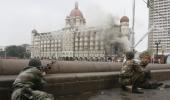The United States Select Committee on Intelligence’s damning report on the Central Intelligence Agency throws spotlight on the brutal tactics adopted by CIA agents to elicit information from terror suspects and yet its ineffectiveness in the sense that it delivered no ‘ticking time bomb’ data that prevented an attack.
Here are 20 observation made in the much-awaited report:
1: The CIA's use of its enhanced interrogation techniques was not an effective means of acquiring intelligence or gaining cooperation from detainees.
2: The CIA's justification for the use of its enhanced interrogation techniques rested on inaccurate claims of their effectiveness.
3: The interrogations of CIA detainees were brutal and far worse than the CIA represented to policymakers and others.
4: The conditions of confinement for CIA detainees were harsher than the CIA had represented to policymakers and others.
5: The CIA repeatedly provided inaccurate information to the Department ofJustice, impeding a proper legal analysis of the CIA's Detention and Interrogation Programme.
6: The CIA has actively avoided or impeded congressional oversight of the programme.
7: The CIA impeded effective White House oversight and decision-making.
8: The CIA's operation and management of the programme complicated, and in some cases impeded, the national security missions of other Executive Branch agencies.
9: The CIA impeded oversight by the CIA's Office of Inspector General.
10: The CIA coordinated the release of classified information to the media, including inaccurate information concerning the effectiveness of the CIA's enhanced interrogation techniques.
11: The CIA was unprepared as it began operating its Detention and Interrogation Programme more than six months after being granted detention
12: The CIA's management and operation of its Detention and Interrogation Programme was deeply flawed throughout the program's duration, particularly so in 2002 and early 2003.
13: Two contract psychologists devised the CIA's enhanced interrogation techniques and played a central role in the operation, assessments, and management of the CIA's Detention and Interrogation Programme. By 2005, the CIA had overwhelmingly outsourced operations related to the programme.
14: CIA detainees were subjected to coercive interrogation techniques that had not been approved by the Department of Justice or had not been authorized by CIA Headquarters.
15: The CIA did not conduct a comprehensive or accurate accounting of the number of individuals it detained, and held individuals who did not meet the legal standard for detention. The CIA's claims about the number of detainees held and subjected to its enhanced Interrogation techniques were inaccurate.
16: The CIA failed to adequately evaluate the effectiveness of its enhanced interrogation techniques.
17: The CIA rarely reprimanded or held personnel accountable for serious and significant violations, inappropriate activities, and systemic and individual management failures.
18: The CIA marginalized and ignored numerous internal critiques, criticisms, and objections concerning the operation and management of the CIA's Detention and Interrogation Programme.
19: The CIA's Detention and Interrogation Programme was inherently unsustainable and had effectively ended by 2006 due to unauthorized press disclosures, reduced cooperation from other nations, and legal and oversight concerns.
20: The CIA's Detention and Interrogation Programme damaged the United States' standing in the world, and resulted in other significant monetary and non-monetary costs.
Read the full report HERE











 © 2025
© 2025